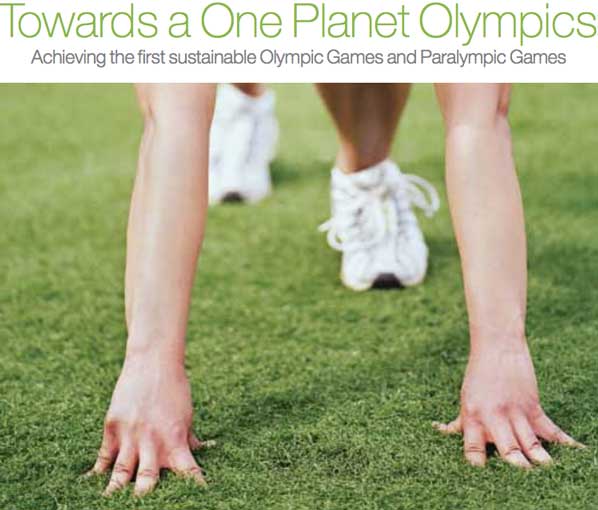Pulled from the London 2012 Olympics Sustainability report (pdf):
If everyone lived as we do in the UK we would need three planets.
Our unsustainable lifestyles have meant that for the last 30 years we have been ‘eating into the Earth’s capital’ rather than ‘living off its interest’.
The promotion of sustainable development has become one of the fundamental objectives of the Olympic Movement…through its Agenda 21– Sport for Sustainable Development.
London 2012, WWF and BioRegional have developed the concept of a One Planet Olympics.
Staging a One Planet Olympics in London would help achieve the first sustainable Games. Sustainability has been at the heart of the London 2012 Bid and Masterplan.
The principles, goals, and legacy of the One Planet Olympics:
Zero Waste
Developing closed resource loops. Reducing the amounts of waste produced, then reclaiming, recycling and recovering
Goals
- No Games waste direct to landfill – all treated as a resource
- Zero waste target a pivotal procurement driver
- Closed-loop waste management at all venues
- Public information campaign to promote high quality front-of-house waste separation
Legacy
- Zero waste policies extend across East London based on high recycling rates and residual waste converted to compost and renewable energy
- Increased market for recycled products
- Closed-loop waste management to be standard practice for major sports events
Local and Sustainable Food
Supporting consumption of local, seasonal and organic produce, with reduced amount of animal protein and packaging
Goals
- Promotion of local, seasonal, healthy and organic produce
- Promotion of links between healthy eating, sport and wellbeing
- Partnerships established with key caterers, suppliers and sponsors
- Composting of food waste as part of Zero Waste plan
Legacy
- Increased markets for farmers in the region
- Markets, catering and retail outlets supplying local and seasonal food
- Composting facilities integrated into closed-loop food strategy
Sustainable Transport
Reducing the need to travel and providing sustainable alternatives to private car use
Goals
- All spectators travelling by public transport, walking or cycling to venues
- Low/no emission Olympic vehicle fleet
- Olympic Park Low Emission Zone
- Carbon offset programme for international travel
- Individualised travel plans as part of integrated ticketing process
Legacy
- Increased connectivity across and between legacy developments and neighbouring communities
- Reduced car dependency
- Car free events policy adopted for other major events
- Greater market for zero carbon transport
